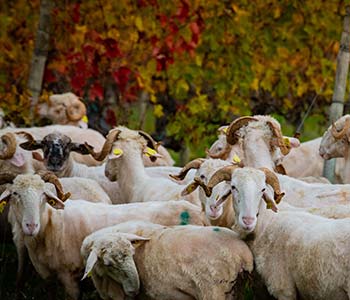
The benefits of animals in the vineyard
On many, mostly organic or biodynamic wineries, you can see animals in the vineyards more and more often. Sheep, goats, ducks, geese or even cows graze there between the vine rows. The impressive effects on soil and biodiversity can be seen after only a short time.
October 2022
Quicktranslation with DeepL
Christof Winkler-Hermaden does. Fred Loimer does it. Michael Goëss-Enzenberg does it. Heike and Gernot Heinrich do it. And many others around the world do it too. They all work with animals in the vineyard. Most of them with sheep, some with cows, goats and chickens like at the Manincor winery in South Tyrol or with geese like Herbert Zillinger in the Weinviertel. Because grazing animals in the vineyard have massive positive effects on the soil, biodiversity and even of an economic nature. In a CLIMATE TALK by the Porto Protocol and a PODCAST by Entrepreneur John Kempf, winegrowers have their say on this extensive benefit.
Less to no fertiliser is needed by some winegrowers and no yeasts; diseases and fungal infestations become less, the vines healthier and even the wine noticeably better. Manure and urine of the animals have massive effects on the soil, grazing regulates and promotes flora and fauna, insects and birds return, humus builds up faster. It is simply fascinating!
Listen and watch:
-
CLIMATE TALK of the Porto Protocol Foundation
»Building Climate Resilience with Animals in the Vineyards«
→ Watch on Youtube, duration 1 hour.
The speakers:
- Tom Croghan, USA, CO-Owner and Winemaker at The Vineyards at Dodon
- Kelly Mulville, USA, Paicines Ranch
- Lígia Santos, Portugal, Caminhos Cruzados
- Johan Reyneke, Southafrica, Onwer and viticulturist at Reyneke Wines
»The use of grazing animals in vineyards seems to be of increasing interest and use around the globe. The information available indicates that it is a vineyard management tool that finds compatibility with regenerative, organic and biodynamic farming practices. This discussion focusses on the many benefits to this technique of vineyard management: how animals enhance carbon sequestration, soil health and biodiversity and offer there reduction in the use of herbicides and chemicals. This is a unique opportunity to learn about and understand this growing trend in farming and pose questions to fellow professional vineyard managers.«
-
PODCAST of the entrepreneur John Kempf (also) mit Kelle Mulville, USA
»Regenerative Agriculture«, Duration 1 hour 10
→ Listen at this link
»Kelly Mulville, a veteran agricultural consultant, is the Vineyard Director at Paicines Ranch in San Benito County, California. For more than 25 years, Kelly has been obtaining impressive results by merging his experience in viticulture with his understanding of Allan Savory’s holistic grazing management techniques. His approach to extended-season vineyard livestock grazing and other ecological practices continue to capture an audience of vineyard managers around the globe.
Kelly and John discuss in this episode:
• How Kelly developed practices around incorporating sheep into his vineyard management.
• Flooring a wildlife biologist with the bird population data on Kelly’s vineyard after implementing new practices.
• The role plant-grazing animals play in reducing insect pressures.
• Kelly’s cover cropping strategy and how it has led to a diversity of 50 species of plants growing in the vineyard.
• The specific holistic management techniques inspired by Allan Savory’s work that have contributed to vineyard success.
• The adaptability of these practices on other crops like nuts and tree crops.«




